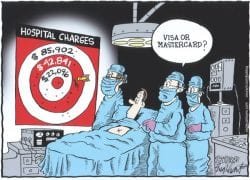Medical Migrants Head to Mexico
There’s hope for price competition in healthcare, but so far only with companies that self–insure by paying for all employee’s medical costs. I do my part by advocating price transparency for hospitals to create competition and put downward pressure on insurance rates.
 Simply require hospitals that accept federal money to post binding prices for the 25 most common inpatient surgeries; the 25 most common outpatient procedures and the 25 most common tests. These turnkey charges must also match the best price offered insurance companies.
Simply require hospitals that accept federal money to post binding prices for the 25 most common inpatient surgeries; the 25 most common outpatient procedures and the 25 most common tests. These turnkey charges must also match the best price offered insurance companies.
Getting patients to act on the information is the problem. This is difficult because surgery candidates – like Instagram followers – tend to believe high prices indicate high quality. This is not necessarily so. Hospitals with high prices may only indicate a large number of Ferraris in the executive parking lot.
The Maryland Health Care Commission posts prices for a handful medical procedures along with associated readmission rates. A surgical readmission is when a patient goes back a second time and is charged more to remove the sponge left inside their body — something hospital executives would never tolerate if the mechanic left a loose wrench under the hood of their Ferrari.
A knee replacement at the brand name Sinai Hospital in Baltimore costs $32,000 and risks an 18 percent readmission rate. Or you can pay $23,000 at the generically named Suburban Hospital, off in a parking lot somewhere, and only worry about a 0.6 percent readmission rate.
Unfortunately, health insurance companies are basically utilities run by bureaucrats who move blood instead of water. A creative solution from insurance companies to motivate patients to comparison shop was going to be difficult. That’s why I cautiously suggested the company apply a portion of the discount to the patient’s deductible in that year and the next.
I am indebted to Phil Galewitz, of Kaiser Health News, for reporting successful, effective incentives for patients do exist, but only for those fortunate enough to work for an enlightened company that self–insures.
Galewitz introduces Donna Ferguson of self–insuring Ashley Furniture in Mississippi who needed a knee replacement. Ashley’s own business is fiercely competitive and it evidently sees no reason why competition won’t work in health care.
That’s why Ashley is a client of North American Specialty Hospital. NASH currently works with 1,200 companies and some 3 million employees. Hospitals aren’t required to post prices in Jefferson Davis’ home state, but we do know in Maryland the low–price, high–quality knee replacement runs $23,000.
Even that lower price is almost twice the $12,000 knee replacement NASH offers in Cancun, Mexico.
The location may give you some pause now that Cancun is mostly famous for decapitated heads that occasionally wash ashore. Unpleasant sure, but none of the deaths were caused by hospital error. NASH makes all the arrangements for employees who opt for south of the border surgery. Travel, hospital, pre– and post–operative care, physical therapy and accommodations at a Sheraton attached to the NASH hospital are included. All the patient has to do is supply the problem.
Donna’s surgeon was a Mayo Clinic trained US doctor flown in for the procedure. All local hospital personnel are US–trained medical professionals. The NASH package even includes travel for one companion. In this instance mom got a knee replacement and dad got a vacation.
Some of you are no doubt thinking, yeah Mexico this year but it’ll be Somalia in 2020 if these greedy capitalists can save a dime. I’m suspicious of corporations, too, but in this case, it’s misplaced. Donna had the option of staying in Mississippi for her surgery. What made the difference was the $5,000 check she received from Ashley for agreeing to the lower–priced NASH package.
Plus, by using a US doctor Donna said, “she could file a malpractice suit in the US” if something went wrong. An option everyone who has ever watched a ‘Call 1–800–SUE–PAIN’ commercial wants to retain.
Patients, companies, hospitals and insurance companies are the four variables in adding competition to healthcare. Hospitals, if they are required to post the turnkey, will lower costs on their own or suffer revenue shortfalls. The 1,200 companies NASH serves have already adopted a competitive shopping outlook. And Donna Ferguson and the other 140 Ashley employees who have agreed to travel for a medical procedure show that patients will respond to incentives.
The last and most difficult target are the insurance companies who are currently content as Obamacare wards of the federal government. Convincing these competitively inert organizations to share savings with patients or adopt other incentives is going to be tough.
Maybe the threat of ‘Medicare for All’ and the potential end of insurance companies will provide motivation before November 2020.




